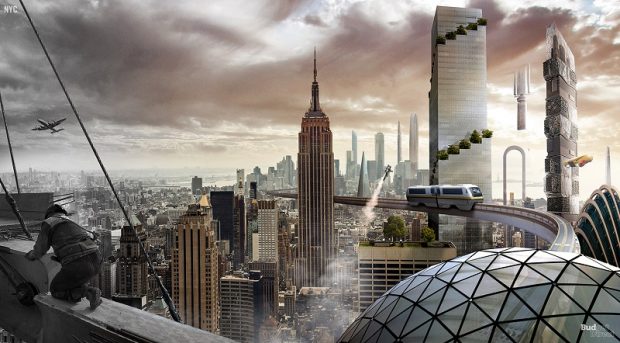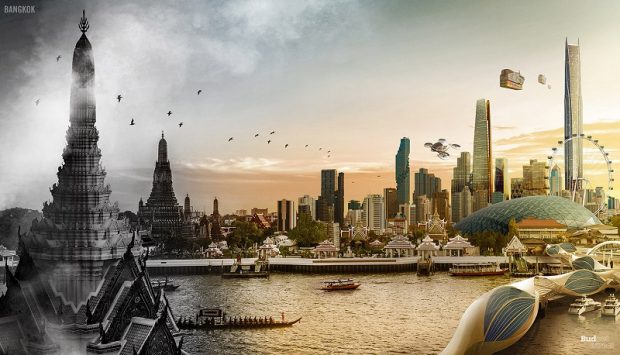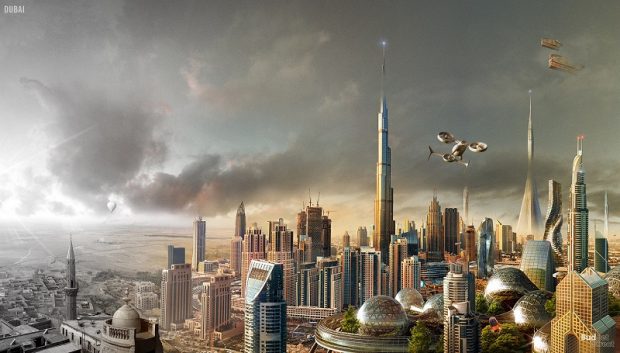What if the built environment itself was a massive time machine? In a sense, that’s just what the cities around us are. Even without having to dig beneath the asphalt, the past manifests itself through the architecture that makes up each city’s unique shape. The intrepid time-travellers of Budget Direct subscribe to just that belief – but they would rather travel forwards through time and into the future.
And so, taking the architectural pipe dreams of seven historic cities into account, they’ve created a stunning new set of images that visualize the passing of time through the past and future buildings of seven historic cities.
Which will you visit first?
New York City
New York’s history isn’t long, but it’s tall. The home of the skyscraper, New York has always had city planners and investors who’ve considered statement-architecture to be a badge of pride.

And now they want to do things with skyscrapers that have never been seen before, such as the Big Bend: an outrageous 1200-meter tower in the shape of an inverted “U” but with a small footprint to save space on the street.
Bangkok
There’s a bit more room to move in China, meaning the buildings have historically been free to stretch out at ground level. The Royal Grand Palace complex, for example, lays claim over 218,400 square metres of ground but is only a few levels high at its tallest.

China is looking upward, though, and a recent history of sprouting skyscrapers is set to be augmented with eco-friendly designs such as a bicycle route that’s cantilevered from the city’s Skytrain tracks.
Dubai
Widely seen as a city of the future, Dubai’s history as a settlement stretches back through the Al Fahidi Historical Neighbourhood of the 1890s.

The city can count on investment that dwarfs that of many other cities – and so do its buildings, in scale and imagination. Take, for example, the Dynamic Tower, whose 80 wind-powered rotating stories are packed with $3m apartments for those who don’t suffer from motion sickness.
Moscow
From Tsarist fancy to Soviet pomposity, you don’t have to look far into Moscow’s past to find astonishing architecture.
Norman Foster’s proposed Crystal Island complex will dwarf them all, if it should ever find the investors. It will also be something of a statement of the contemporary socio-economic landscape, with theatres, galleries, shops and restaurants, 3,000 hotel rooms, 900 apartments and a school spread across 2.5 million square meters: a self-sufficient space station waiting to happen!
Rio de Janeiro
Brazil is on the up. Familiar sights such as Sugarloaf Mountain and the iconic Christ the Redeemer monument barely cast a shadow over Rio’s famous beaches, and new, ecologically-sound developments are likewise intended to blend or complement the surroundings.
Proposals for an underwater farm that sustains floating, island bubble villages built from ocean plastic pollution look less like a vision of the future and more like welcoming alien settlement in another galaxy.
London
London is known to outsiders for its famous historic architecture, but the truth is it’s one big building site with ambitious new developments sprouting every day. With nicknames like the Gherkin and the Walkie-Talkie, it’s easy to see why the shapes of many of these buildings cause controversy amongst the public down below.
The ‘Endless Vertical City’ sounds a more utopian dream – depending on your point of view. The structure would house the entire city in a single, ever upwards-expanding structure. Can’t be any more frightening than those floating London buses, can it?
Paris
Nobody cultivates their cultural profile quite as carefully as the French, and you can expect forthcoming statements to be as elegant and sophisticated as the Eiffel Tower and the pyramid at the Louvre.
Future developments are likely to embrace the inherent grace of nature as a riposte to years of iron and glass. Paris as garden city? Oui, s’il vous plait!
